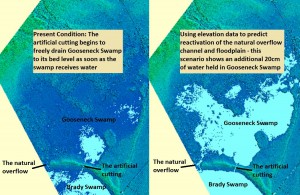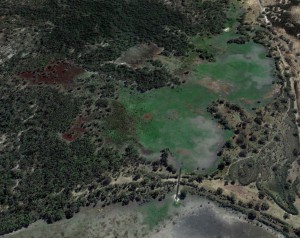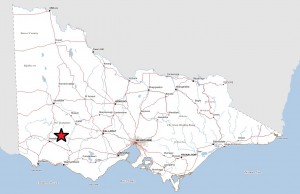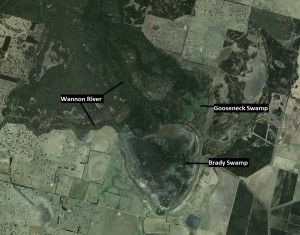
Restoration Trial at Gooseneck Swamp, Grampians National Park
Gooseneck Swamp is situated at the far south-eastern corner of the Grampians National Park in Victoria’s South West. Gooseneck Swamp and Brady Swamp are wetlands of the Wannon River Floodplain, as the river reaches the flats after exiting the valley between the Serra and Mt William Ranges within the Grampians.
Having been made the terminus for discharging flows from the Bunnugal Rural Drainage Area from around 1900 (bringing water from the drained Heifer Swamp), both Gooseneck and Brady Swamp were themselves subsequently drained in in the 1950s.
Although Gooseneck Swamp naturally discharges into Brady Swamp, it must fill to a certain height before the natural discharge channel and wider connecting floodplain receive flows. As a result, the artificial cutting in the lunette bank that separates Gooseneck Swamp from Brady Swamp, was enabling the swamp to freely drain to its bed level once inflows ceased. The images below show the location of the lunette bank that separates the two swamps, the original flowpath and the artificial cutting.

Information from the 2013 digital elevation model (using LiDAR technology, funded by the Glenelg Hopkins CMA) which was used to guide the restoration trial. In this scenario, the impact of the drain in removing water well below the natural sill level of the wetland is clearly illustrated. Inundation extent at different levels marked in light blue. (Click to enlarge, and press stop slideshow to view in detail)
Interest in the restoration of Gooseneck Swamp began in the mid 1980s, when the property was acquired by the Victorian Government and eventually incorporated into the Grampians National Park. In 2013, after many years of work, modelling studies and biological investigations by a range of organisations, Nature Glenelg Trust began working towards a staged process of restoration at the site in partnership with the Glenelg Hopkins CMA, Parks Victoria and local landholders – starting with a proposal to construct a low cost and low risk trial sandbag weir structure in the Gooseneck Swamp artificial outlet drain.
Thanks to the support of the Department of Environment and Primary Industries – Communities for Nature Grants, the restoration trial structure was completed and in place in August 2013. Approximately 18 months later the works were made permanent, with the breached earthen bank fully re-instated by Nature Glenelg Trust thanks to the funding support of the Victorian Government.
For more information on the step-by-step progress of the trial and subsequent permanent works, please browse the project blogs, via the links below.

Artificial Outlet that drains Gooseneck Swamp (situated above the lunette bank shown) into Brady Swamp (bottom of image)
- Revisiting Gooseneck Swamp 10 years later – NGT’s first restoration site in the Grampians National Park 28/03/2024
- ‘Wetland Restoration 101’ – Reading the landscape with NGT (recorded at the Tasmanian Landcare Conference) 26/10/2021
- Grampians remote monitoring – The wetlands fill as the fun begins! 31/08/2021
- A glimpse back to the good old days – early season upper Wannon River flows 31/08/2021
- An exciting citizen science opportunity in the Grampians awaits You! 27/04/2021
- A weekend of wetland exploration with the South East Australian Naturalists’ Association 27/04/2021
- Exploring NGT restored wetlands – School holiday adventures 21/01/2021
- Under the surface – the latest round of aquatic fauna assessments in the Wannon River wetlands 21/01/2021
- Revisiting the RRR Conference – Part 2 – Breaking long-term deadlocks to restore wetlands on public and private land 10/05/2018
- Grampians wetlands update 06/12/2017


